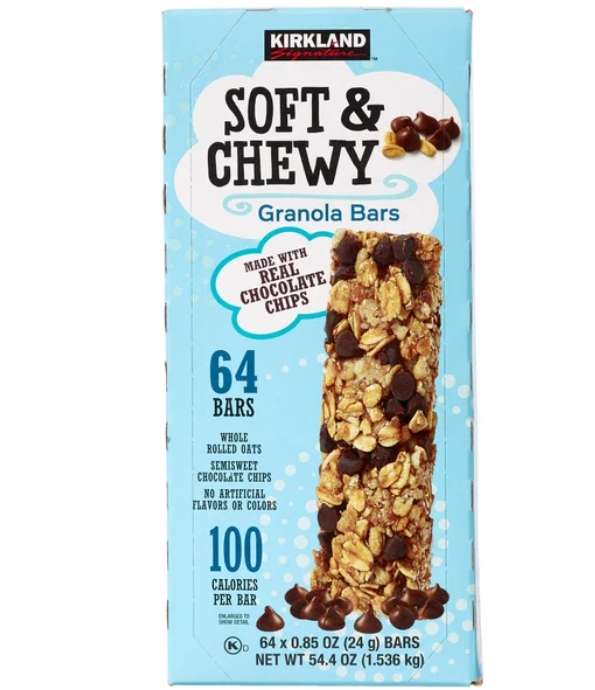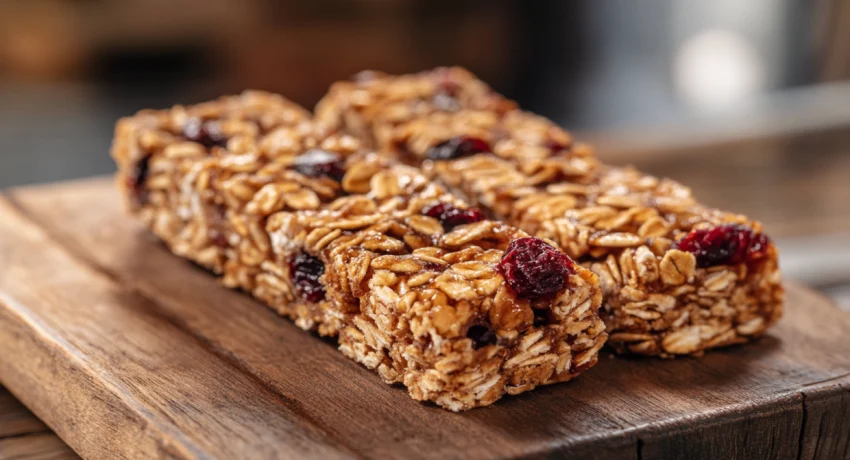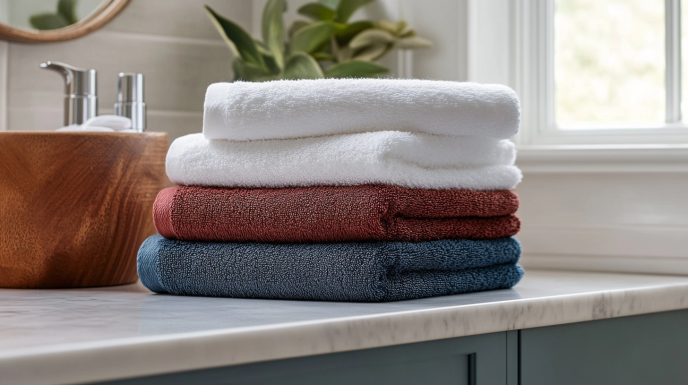
Kirkland Signature Soft & Chewy Granola Bars, 0.85 oz, 64-count
- Soft & Chewy Bars
- Whole Rolled Oats
- No Artificial Flavors or Colors
- Kosher
- Made With Real Chocolate Chips
Unwrapping the Truth About This Popular Costco Staple
As I stand in the massive aisles of Costco, shopping cart in hand and hunger pangs setting in, my eyes inevitably drift to the familiar red box that’s become a staple in my pantry. Kirkland Signature Granola Bars – that convenient, grab-and-go snack that somehow always finds its way into my cart. But how much do we really know about these ubiquitous treats that seem to populate lunch boxes, office drawers, and hiking backpacks across America?
Today, I’m diving deep into everything you need to know about Kirkland Signature Granola Bars – from ingredients to nutrition, flavors to value, and everything in between. Whether you’re a longtime fan or considering trying them for the first time, this comprehensive guide will answer all your burning questions about these popular Costco snacks.
What’s Really in Those Bars? Breaking Down the Ingredients
Let’s start with the basics – what exactly are you putting into your body when you tear open that foil wrapper? Kirkland Granola Bars feature a blend of whole grain oats as their foundation, which provides that characteristic chewy texture we’ve come to love. The ingredient list continues with some familiar items: brown sugar, crisp rice, honey, and various oils that bind everything together.
Depending on the variety, you’ll find additional ingredients like chocolate chips, almonds, peanuts, or dried fruits. The chocolate chip bars contain semi-sweet chocolate chips, while the peanut butter varieties incorporate actual peanut butter into the mix.
What’s worth noting is that these bars do contain some ingredients that health-conscious consumers might want to be aware of. You’ll find high fructose corn syrup in small amounts, as well as palm oil and various preservatives that extend shelf life. While these ingredients aren’t unusual for packaged snack foods, they’re worth mentioning for those who prioritize whole, unprocessed foods.
The bars also contain soy lecithin (an emulsifier) and natural flavors. For those with allergies, it’s important to note that most varieties are produced in facilities that process nuts, so cross-contamination is possible even in varieties that don’t explicitly contain nuts.
The Health Question: Are Kirkland Granola Bars Actually Good For You?
This might be the million-dollar question. Are these convenient snacks a healthy choice or just another processed food masquerading as a nutritious option?
The truth, as with most foods, lies somewhere in the middle. Kirkland Granola Bars do offer some nutritional benefits: they contain whole grains from the oats, which provide fiber. Depending on the variety, they may also contain nuts, which add healthy fats and protein. Some versions include dried fruits, which contribute natural sugars along with small amounts of vitamins and minerals.
However, these bars are ultimately a processed food product designed for convenience and taste rather than optimal nutrition. They contain added sugars (from multiple sources including brown sugar, honey, and high fructose corn syrup), oils, and preservatives.
When compared to fresh, whole foods like fruits, vegetables, or homemade granola bars where you control the ingredients, they fall short on the nutrition spectrum. But when compared to many other packaged snacks like cookies, candy bars, or chips, they represent a somewhat better option with their inclusion of whole grains and modest portion control.
Calorie Countdown: Understanding the Nutrition Facts
If you’re watching your caloric intake, you’ll want to know exactly what you’re getting with each bar. The standard Kirkland Signature Chewy Granola Bars typically contain between 140-160 calories per bar, depending on the specific flavor variety.
The chocolate chip varieties tend to be on the higher end of that spectrum, while the basic granola varieties might be slightly lower. This calorie count puts them in line with similar products from brands like Nature Valley or Quaker.
Beyond calories, each bar typically provides:
- 2-3 grams of protein
- 1-2 grams of fiber
- 6-8 grams of fat
- 15-20 grams of carbohydrates
- 7-12 grams of sugar
The protein content is modest but does help provide some satiety. The fiber content, while not impressive, contributes to the bar’s ability to take the edge off hunger. The fat content varies significantly depending on whether nuts are included in the variety.
Where these bars often draw criticism is in their sugar content. With 7-12 grams of sugar per bar (depending on variety), they contain roughly 2-3 teaspoons of added sugar. The American Heart Association recommends limiting added sugar to no more than 6 teaspoons daily for women and 9 teaspoons for men, so a single bar represents a significant portion of that recommended limit.
Flavor Fiesta: What Varieties Can You Choose From?
One of the appeals of Kirkland Granola Bars is the variety of flavors available. The standard box typically includes a mix of popular flavors, though the exact selection can vary somewhat depending on your location and Costco’s current stock.
Common flavors include:
- Chocolate Chip
- Peanut Butter Chocolate Chip
- Oats and Honey
- Chocolate Chunk
- Trail Mix varieties with nuts and dried fruits
- Dark Chocolate Cherry (in some locations)
- Almond varieties
The variety packs usually contain two or three different flavors, allowing family members with different preferences to all find something they enjoy. This variety is particularly helpful for households with kids who might be picky eaters or for office settings where multiple people might be sharing from the same box.
The flavor profiles tend to be sweet but not overpowering, with the chocolate varieties being the most dessert-like and the oats and honey varieties offering a more subtle sweetness. The peanut butter options provide a nice savory note that balances the sweetness well.
The Gluten Question: Can Those with Celiac Disease Partake?
For those with celiac disease or gluten sensitivity, I have some unfortunate news: standard Kirkland Signature Granola Bars are not certified gluten-free. While the primary ingredient is oats, which are naturally gluten-free, the oats used in these bars are not certified gluten-free oats. This means they may have been processed in facilities that also process wheat, barley, or rye.
Additionally, some varieties may contain ingredients derived from gluten-containing grains or may have a risk of cross-contamination during manufacturing. The packaging typically includes a warning that the product contains or may contain wheat, which is a clear indication that these bars are not suitable for those requiring a strictly gluten-free diet.
If you require gluten-free snacks, Costco does offer other options that are certified gluten-free, but unfortunately, the standard Kirkland Signature Granola Bars don’t fall into that category.
Value Proposition: The Costco Price Advantage
One of the most compelling reasons people choose Kirkland Granola Bars is the exceptional value they offer. As with most Costco products, buying in bulk translates to significant savings compared to purchasing similar products from mainstream grocery stores.
At most Costco warehouses, a box of Kirkland Signature Granola Bars containing 60-72 individually wrapped bars typically costs between $10-$14, depending on location and any ongoing promotions. This breaks down to roughly 15-23 cents per bar.
When you compare this to name-brand alternatives like Nature Valley or Quaker, which often cost 50-75 cents per bar when purchased in smaller quantities at regular supermarkets, the savings become apparent. Even when comparing to other bulk options or store brands at other retailers, Kirkland’s offering typically provides better value.
This price advantage is one of the main reasons these bars have become such a popular staple for families, office break rooms, and anyone looking to stock up on convenient snacks without breaking the bank.
Organic Origins? Understanding Kirkland’s Sourcing
For those prioritizing organic ingredients, I need to clarify an important point: the standard Kirkland Signature Granola Bars are not organic. They’re made with conventional ingredients rather than certified organic ones.
However, Costco does sometimes offer organic alternatives under either the Kirkland Signature Organic label or from other brands they carry. These organic options typically come at a premium price point compared to the standard granola bars, reflecting the higher cost of organic ingredients.
If organic certification is important to you, you’ll want to specifically look for boxes labeled as organic, as the standard Kirkland Granola Bars don’t meet this criterion. The good news is that Costco’s commitment to expanding their organic offerings means you might find organic alternatives in your local warehouse, though availability can vary by location and season.
Sugar Shock: How Sweet Are These Snacks?
I’ve touched on sugar content briefly, but it deserves a deeper look since it’s a significant nutritional concern for many consumers. The standard Kirkland Granola Bars contain approximately 7-12 grams of sugar per bar, with the chocolate and fruit varieties typically landing at the higher end of that spectrum.
This sugar comes from multiple sources, including:
- Brown sugar
- High fructose corn syrup
- Honey
- Sugar within inclusions like chocolate chips or dried fruits
To put this in perspective, 4 grams of sugar equals approximately 1 teaspoon. So each bar contains roughly 2-3 teaspoons of sugar – a significant amount for a small snack. The American Heart Association recommends limiting daily added sugar intake to 24 grams (6 teaspoons) for women and 36 grams (9 teaspoons) for men, meaning a single granola bar could represent a third to half of your recommended daily limit.
For those monitoring sugar intake due to health concerns like diabetes, weight management, or general health optimization, this is definitely something to consider. While these bars don’t contain as much sugar as a candy bar or pastry, they’re not a low-sugar option either.
Kid-Friendly Fare: Are These Suitable for Little Ones?
Many parents turn to granola bars as a convenient option for lunch boxes, after-school snacks, or on-the-go fuel for busy kids. But are Kirkland Granola Bars a good choice for children?
The portion size of Kirkland bars is appropriate for most school-aged children, offering enough calories and nutrients to provide a reasonable snack without overwhelming smaller appetites. Kids typically enjoy the sweet flavor profiles, especially the chocolate chip varieties, making them an option that children will actually eat rather than trade away at the lunch table.
On the nutritional front, the bars do provide some whole grains and, depending on the variety, may include nuts that offer healthy fats and protein. However, the sugar content is a legitimate concern for children, whose recommended sugar limits are even lower than adults. The American Heart Association suggests children should consume less than 25 grams of added sugar per day, meaning a single bar could represent nearly half that amount.
For parents seeking to balance convenience with nutrition, these bars can be part of a varied diet that includes plenty of whole, unprocessed foods. They’re certainly a better option than many ultra-processed snacks marketed to children, but they shouldn’t be a daily staple or the primary source of nutrition in a child’s diet.
Shelf-Life Secrets: How Long Do They Last?
One of the advantages of Kirkland Granola Bars is their impressive shelf life, making them ideal for emergency food supplies, occasional snacking, or stocking an office break room where turnover might be slow.
Typically, these bars have a shelf life of approximately 9-12 months from the production date when unopened. The individual wrapping helps preserve freshness and prevents the bars from becoming stale or soggy, even when stored for extended periods.
For best quality, store the boxes in a cool, dry place away from direct sunlight and strong odors (the bars can absorb odors from their environment if stored improperly). There’s no need to refrigerate them, though keeping them in a climate-controlled environment will help maintain their texture and flavor.
Once the box is opened, the individually wrapped bars will maintain their quality for the duration of their shelf life as long as the wrappers remain intact. If a wrapper is damaged, that particular bar should be consumed promptly as exposure to air will cause it to become stale.
Nut Knowledge: Allergy Considerations
Many varieties of Kirkland Granola Bars do contain nuts, making them unsuitable for those with nut allergies. The most common nuts included are almonds and peanuts, though specific varieties may contain other tree nuts as well.
Even more importantly for those with severe allergies, all Kirkland Granola Bars – even those varieties that don’t explicitly contain nuts – typically carry an allergen warning stating they are produced in facilities that process tree nuts and peanuts. This means there’s a risk of cross-contamination, making these bars potentially dangerous for individuals with severe nut allergies.
The packaging clearly labels the presence of allergenic ingredients, but those with serious allergies should exercise caution with any processed food product. For families managing nut allergies, these bars are generally not the safest option, and alternatives specifically labeled as nut-free would be more appropriate.
Weight Loss Wisdom: Can Granola Bars Help You Shed Pounds?
With their convenient portion control and moderate calorie count, some might wonder if Kirkland Granola Bars could be a helpful tool in a weight loss journey. The answer requires some nuance.
On the positive side, the portion-controlled nature of these bars (around 140-160 calories) can help prevent mindless overeating that might occur with unpackaged snacks. Their combination of carbohydrates, small amounts of protein, and some fiber can provide quick energy and take the edge off hunger between meals.
However, several factors make them less than ideal as a primary weight loss strategy:
- The relatively high sugar content can trigger cravings for some people
- The modest fiber and protein content means they may not keep you satisfied for long
- They’re calorie-dense compared to whole fruits or vegetables that provide more volume and satiety for fewer calories
- As a processed food, they lack the full spectrum of nutrients found in whole foods
For weight management, these bars might work as an occasional convenient option within a broader dietary pattern focused on whole, minimally processed foods. They’re most appropriate as a planned snack when you know you’ll need something shelf-stable and portable, rather than as a daily habit or meal replacement.
Protein Profile: How Much Muscle-Building Power?
Protein has become a major focus for many consumers, and with good reason – it helps build and maintain muscle mass, contributes to satiety, and plays numerous essential roles in the body. So how do Kirkland Granola Bars stack up in the protein department?
Most varieties of Kirkland Granola Bars contain between 2-3 grams of protein per bar, with the nut-containing varieties typically landing on the higher end of that range. This is a modest amount of protein – enough to contribute slightly to your daily needs but not enough to consider these bars a significant protein source.
For context, nutritionists typically recommend consuming 15-30 grams of protein per meal and 5-10 grams per snack for optimal satiety and muscle maintenance. With just 2-3 grams, these bars fall short of being a protein-focused snack.
If protein is a priority for you, pairing a granola bar with a protein source like Greek yogurt, a string cheese, or a small handful of nuts would create a more balanced snack. Alternatively, Costco does offer higher-protein bar options from other brands that might better meet this need.
Brand Battle: Kirkland vs. Nature Valley Showdown
Nature Valley is perhaps the most recognized name in the granola bar market, so how do Kirkland’s offerings compare to this established brand?
In terms of taste and texture, Kirkland Granola Bars are often compared favorably to Nature Valley’s Chewy bars (not to be confused with Nature Valley’s Crunchy bars, which have a distinctly different, crunchier texture). Many consumers find the flavor profiles and overall eating experience quite similar between Kirkland and Nature Valley Chewy varieties.
Nutritionally, the two brands are comparable, with similar calorie counts, sugar content, and ingredient lists. Neither would be considered a health food, but both offer similar nutritional profiles typical of commercial granola bars.
The most significant difference comes down to price. Kirkland Granola Bars typically cost about half as much per bar compared to Nature Valley when purchased at regular retail prices. This substantial savings is the primary reason many consumers choose the Kirkland version, particularly when buying for families or groups where the volume of consumption makes the savings more impactful.
Quality-wise, most consumers find little difference between the two brands, making Kirkland the value winner in this comparison. However, Nature Valley does offer a wider range of varieties and formulations, including options like their protein bars that might better suit specific dietary needs.
Meal Replacement Musings: Can They Stand In For Actual Food?
In our rushed modern lives, it’s tempting to grab a granola bar in lieu of sitting down for a proper meal. But can Kirkland Granola Bars actually serve as meal replacements?
The short answer is no – these bars were designed to be snacks, not meal replacements. With only 140-160 calories, they provide just a fraction of the energy most adults need from a meal (typically 400-700 calories depending on age, sex, activity level, and individual needs).
Additionally, they lack the nutritional completeness of a balanced meal. A proper meal should include:
- Adequate protein (typically 15-30 grams)
- Healthy fats
- Complex carbohydrates
- Fiber
- A variety of vitamins and minerals
With just 2-3 grams of protein, limited fiber, and a narrow nutrient profile, these bars simply don’t meet the criteria for a complete meal. Using them as occasional emergency meal bridging when no other options are available is one thing, but regularly substituting them for proper meals could lead to nutritional deficiencies and inadequate energy intake.
If you find yourself regularly tempted to replace meals with granola bars due to time constraints, consider more nutritionally complete options like meal replacement shakes specifically formulated to provide balanced nutrition, or prepare simple make-ahead meals that can be quickly reheated or assembled when time is tight.
Consumer Consensus: What Do Reviews Reveal?
Kirkland Granola Bars enjoy generally positive reviews from consumers, with most citing the excellent value as their primary advantage. On various review platforms and forums, these bars typically receive ratings in the 4-4.5 star range (out of 5).
Common praise points include:
- Great value for the quantity received
- Consistent quality across boxes
- Good flavor that appeals to both adults and children
- Convenient packaging for on-the-go snacking
- Decent texture that’s not too hard or too soft
Criticisms typically center around:
- High sugar content
- Somewhat processed ingredient list
- Occasional inconsistencies in freshness
- Limited flavor selection compared to some competing brands
Many reviewers mention that they’ve been purchasing these bars for years, suggesting strong customer loyalty to the product. Parents frequently comment on how convenient they are for kids’ lunches and after-school activities, while office workers note they’re perfect for desk drawers and midday hunger pangs.
Overall, consumers seem to view these bars as a solid, reliable product that delivers good value and consistent quality – not a gourmet or health food item, but a dependable, affordable snack option.
Variety Pack Virtues: Mix It Up
One of the appealing aspects of Kirkland Granola Bars is that they typically come in variety packs rather than single-flavor boxes. The standard package usually contains 2-3 different flavors, with chocolate chip and peanut butter chocolate chip being the most common combinations.
This variety serves several practical purposes:
- It prevents flavor fatigue when consuming bars regularly
- It accommodates different preferences within households or offices
- It allows consumers to discover which flavors they prefer without committing to a single-flavor purchase
The variety pack approach is particularly appreciated in family households where different family members may have different preferences, or in office settings where multiple people might be sharing from the same box.
While the variety within each box is somewhat limited (usually just 2-3 flavors rather than the 5+ varieties some competitors offer), most consumers find this sufficient given the excellent value proposition. For those who strongly prefer a particular flavor, the minor inconvenience of having unwanted varieties is typically outweighed by the significant cost savings compared to buying single-flavor boxes of other brands.
Vegan Verdict: Plant-Based Analysis
For those following a vegan lifestyle, I have some news that might disappoint: standard Kirkland Signature Granola Bars are not vegan. While they are vegetarian, they contain several animal-derived ingredients that make them unsuitable for a vegan diet.
The most common non-vegan ingredients in these bars include:
- Honey (a key sweetener in many varieties)
- Milk ingredients (found in the chocolate varieties)
- Other dairy derivatives that may appear in various flavors
Additionally, some varieties contain gelatin or other animal-derived additives that aren’t compatible with vegan dietary restrictions.
Costco does occasionally offer vegan-friendly granola bar options from other brands, but the standard Kirkland Signature Granola Bars are not formulated to meet vegan requirements. Those following a vegan diet would need to look for specifically labeled vegan alternatives, which Costco has been increasingly adding to their inventory as plant-based diets grow in popularity.
Procurement Pointers: Where to Buy Beyond the Warehouse
While Costco is obviously the primary retailer for Kirkland Signature products, what options exist for those who don’t have a Costco membership or who prefer online shopping?
Your options for purchasing Kirkland Granola Bars outside of physical Costco warehouses include:
- Costco.com – You can order many Kirkland products online, though a membership is still required, and there may be a delivery fee depending on your order total.
- Amazon – Some Kirkland products, including their granola bars, are available on Amazon, though typically at a markup compared to in-warehouse prices. This option provides convenience but sacrifices some of the value proposition.
- Third-party resellers – Various online retailers purchase Costco products in bulk and resell them, though again at higher prices than you’d pay directly at Costco.
- Instacart and similar delivery services – These allow you to order from Costco without a membership in some areas, but they charge delivery fees and service charges that significantly increase the cost.
It’s worth noting that purchasing through these alternative channels typically negates much of the cost advantage that makes Kirkland products attractive in the first place. The bars might end up costing as much as or more than name-brand alternatives when purchased through third parties.
For regular consumers of these products, a Costco membership ($60-$120 annually) often pays for itself quickly through the savings on bulk purchases, making it the most economical option for those who consume these bars regularly.
Trail-Ready Treats: Outdoor Adventure Suitability
Granola bars have long been associated with outdoor activities, and Kirkland Granola Bars are indeed well-suited for hiking, camping, travel, and other adventures for several practical reasons:
- Portability – The individual wrapping makes them easy to toss in a backpack, purse, or pocket without worrying about crushing or spoilage.
- Energy density – They provide a good calorie-to-weight ratio, delivering quick energy in a lightweight package, important when you’re carrying all your supplies.
- Temperature stability – These bars hold up reasonably well in varying temperatures (though the chocolate varieties can melt in extreme heat).
- Extended shelf life – Their long shelf life makes them ideal for emergency kits or infrequent adventures.
- Quick consumption – They can be eaten quickly on the go without preparation or cleanup.
The primary nutritional considerations for outdoor activities relate to the type and duration of your adventure. For short hikes or casual outings, these bars provide a quick energy boost from their carbohydrates and sugars. For more intensive activities, you might want to supplement with additional protein and electrolytes.
Many serious hikers and outdoor enthusiasts include Kirkland Granola Bars in their food supplies specifically because of the excellent value – when you’re packing food for multi-day trips, the savings can be substantial compared to specialty outdoor nutrition products.
The Final Verdict: Are Kirkland Granola Bars Worth It?
After this deep dive into every aspect of Kirkland Signature Granola Bars, what’s the final assessment? Are they worth adding to your shopping cart on your next Costco run?
For most consumers, the answer is a qualified yes. These bars offer excellent value in a convenient, shelf-stable, portion-controlled format that works well for many different situations. They provide a familiar, generally well-liked flavor profile that appeals to both adults and children, making them versatile for family use.
Nutritionally, they occupy a middle ground – not a health food by any means, but not the worst option either. They provide some whole grains and a modest amount of fiber and protein, though their sugar content is definitely on the high side.
Their greatest strength is undoubtedly their value proposition. The cost per bar is significantly lower than comparable products from other brands, especially when purchased directly from Costco warehouses. For families, offices, or individuals who go through granola bars quickly, this cost savings can be substantial over time.
The areas where they fall short include their relatively high sugar content, their processed nature, and their lack of specialty options for those with dietary restrictions like gluten-free, vegan, or organic preferences (though Costco does offer some alternatives in these categories from other brands).
Ultimately, Kirkland Granola Bars represent a pragmatic compromise between nutrition, taste, convenience, and cost that makes them a reasonable choice for many households looking for accessible snack options in today’s busy world.
Whether they belong in your pantry depends on your specific priorities, dietary needs, and lifestyle – but for millions of Costco shoppers, that familiar red box continues to find its way into carts month after month, year after year, as a testament to their practical value in everyday life.




